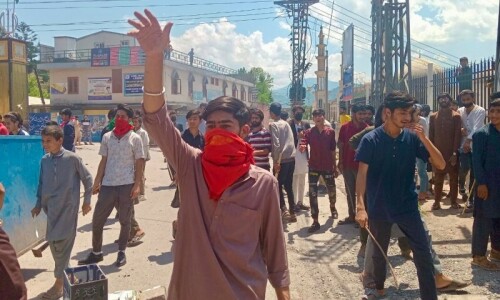Pakistan should reverse lifting of moratorium on death penalty: HRW

NEW YORK: The Human Rights Watch (HRW) has suggested that the Pakistani government reverse the lifting of the moratorium on death penalty for capital crimes and move towards complete abolition of the capital punishment, according to a report by the HRW.
The government went ahead with the decision to lift the moratorium completely on March 10, 2015.
Earlier, Prime Minister Nawaz Sharif had partially lifted the moratorium in the wake of the Taliban attack on Peshawar’s Army Public School in December last year.
He also called for the implementation of a nation-wide security plan ─ the National Action Plan ─ to crack down on insurgency and sensitive militant elements across Pakistan. As of this morning, 25 convicts have been put to death since the lifting of the moratorium on Dec 17, 2014 (see timeline below).
Also read: Waking to sleep?
Phelim Kine, Deputy Asia Director HRW said, “The Pakistani government’s ill-conceived decision to completely abandon its death penalty moratorium puts thousands of lives at risk."
“Government approval of a potential nationwide execution spree is a knee-jerk reaction to a terrible crime rather than a considered response to legitimate security concerns.”
There are currently more than 8,000 prisoners on death row in Pakistan facing execution for both, terrorism and capital offenses including murder, rape, treason and blasphemy.
The HRW’s concerns may not be completely unfounded as some prisoners on death row belong to marginalised groups, and may not be able to secure a fair trial for themselves.
The report featured on the HRW website says:
“Human Rights Watch opposes the death penalty in all circumstances because of its inherent cruelty. Pakistan’s use of the death penalty is inconsistent with international human rights law, according to statements of United Nations human rights experts and various UN bodies.
Human rights law upholds every human being’s ‘inherent right to life’ and limits the death penalty to ‘the most serious crimes,’ typically crimes resulting in death.
Pakistan should join with the many countries already committed to the UN General Assembly’s December 18, 2007 resolution calling for a moratorium on executions and a move by UN member countries toward abolition of the death penalty.”
Mr. Kine believes that Pakistan’s government should recognise the well-documented failure of the death penalty as a crime deterrent and join the growing number of countries that have abolished capital punishment.
“The government should treat the death penalty for what it is: a cruel and irrevocable punishment rather than a policy solution to complex crime and security problems,” he said.
Editorial: Death for terrorism
Faced with an escalating crime rate, the death penalty may appear to be an easy and obvious solution. There is a common perception that the death penalty deters people from committing crimes and that carrying out executions will lead to a decrease in crime. In reality, the death penalty is no ‘quick fix’ to murder or acts of terrorism.
Resorting to executions risks creating the impression that the government is being tough on crime without necessarily addressing fundamental problems in law enforcement and the justice system. There is no convincing evidence that capital punishment is effective in deterring crime. Experience from around the world demonstrates that an effective deterrent to crime is to ensure that the criminal is apprehended, convicted and punished.










































